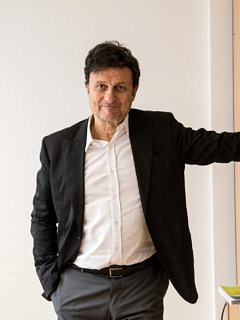Prof. Dr. Stefan Fröhlich
Prof. Dr. Stefan Fröhlich
Stefan Fröhlich war von 2003 bis 2024 Inhaber der Professur für Internationale Beziehungen und Politische Ökonomie an der Friedrich-Alexander-Universität Erlangen-Nürnberg und lehrt seit vielen Jahren als Gastdozent am Collège d`Europe in Brügge, dem College of Europe in Natolin (Warschau), dem Zentrum für Europäische Integrationsforschung in und Centre for Advanced Security, Strategic and Intgrations Studies (CASSIS) in Bonn. Zu seinen Forschungsschwerpunkten gehören globale Ordnungsfragen, Außen(wirtschafts-) und Sicherheitspolitik Deutschlands, der EU und der USA, transatlantische Beziehungen sowie die Internationale Politische Ökonomie.
Professor Fröhlich studierte von 1979 bis 1985 Politikwissenschaft, Wirtschaftswissenschaften, Anglistik und Hispanistik in Bonn, Paris, Philadelphia und Washington. Das Studium schloss er 1985 mit einem Magister an der Universität Bonn ab, 1989 erfolgte die Promotion in Bonn, 1996 die Habilitation im Fach Politische Wissenschaft.
Von 1998-2002 war Professor Fröhlich Programmdirektor des Postgraduiertenkollegs „European Studies“ am Zentrum für Europäische Integrationsforschung in Bonn, es folgten Gastdozenturen in u.a. in Antwerpen, Budapest, London, Mailand, Moskau, Boston, Tübingen, Wien, Innsbruck, Zürich, Washington, Paris und Duedien. Zudem forschte und lehrte er mehrmals in Washington D.C., 2002-2003 als Gastprofessor am Center for Transatlantic Relations an der John Hopkins-University, 2007-2008 am Woodrow Wilson International Center for Scholars und 2016-2017 an der Transatlantic Academy des German Marshall Fund.
Professor Fröhlich ist Autor zahlreicher Fachartikel und Bücher, u.a. „New Perspectives on Transatlantic Relations. Multidisciplinary Approaches“ (2021), „The End of Self-Bondage – German Foreign Policy in a World Without Leadership“ (2021), „Das Ende der Selbstfesselung: Deutsche Außenpolitik in einer Welt ohne Führung“ (2019), „East Asia’s Security Architecture and the Role of the United States“ (2017), „Die Europäische Union als globaler Akteur. Eine Einführung“ (2014) und „Future Perspectives for Transatlantic Relations“ (2012). Seit vielen Jahren ist er ein gefragter Experte für zahlreiche deutsche und internationale Medien.
Er ist Mitglied in zahlreichen Gremien, u.a. der Deutschen Atlantischen Gesellschaft, dem Zentrum für Europäische Integrationsforschung Bonn, der Deutschen Gesellschaft für Auswärtige Politik, der Deutschen Gesellschaft für Politikwissenschaft, dem Arbeitskreis Europäische Integration und dem Institut für europäische Politik.
- 1958 Geboren in Bonn
- 1979-1985 Studium der Politikwissenschaft, Wirtschaftswissenschaften, Anglistik und Hispanistik in Bonn, Paris, Philadelphia und Washington (1979/80: Fulbright-Stipendiat)
- 1985 Magister Universität Bonn
- 1989 Promotion Universität Bonn
- 1996 Habilitation im Fach Politische Wisssenschaft an der Universität Bonn
- 1985-1989 Wissenschaftlicher Mitarbeiter im Deutschen Bundestag (Abgeordnetenbüro)
- 1989-1994 Wissenschaftlicher Assistent am Seminar für Politische Wissenschaft der Universität Bonn (Lehrstuhl Professor Dr. Hans-Peter Schwarz)
- 1995/96 Forschungsstipendiat des German Marshall Fund of the United States (Washington)
- 1996 Vertretung einer Professur an der Universität Trier
- 1997 Mitarbeiter in der Deutschen Gesellschaft für Auswärtige Politik und Privatdozent an der Universität Bonn
- 1998-2002 Programmdirektor des Postgraduiertenkollegs „European Studies“ am Zentrum für Europäische Integrationsforschung (ZEI) der Universität Bonn sowie Privatdozent an der Universität Bonn
- Seit 1999 Gastdozenturen unter anderem in Antwerpen, Brügge, Budapest, Bonn (ZEI), Mailand, Birmingham, London, Wien, Tübingen, Washington und Moskau
- 2002-2003 Gastprofessor am Center for Transatlantic Relations an der Johns Hopkins-University in Washington, D.C
- Seit 4/2003 Professor für Internationale Politik an der Universität Erlangen-Nürnberg
- 2/2007 – 8/2007 Public Scholar am Woodrow Wilson Center for International Scholars, Washington, D.C, USA
- 9/2016 – 5/2017 Senior Fellow beim German Marshall Fund sowie die Teilnahme an der „Transatlantic Academy“ während dem Wintersemester 2016/2017 in Washington, D.C
- derzeit Gastdozent am Collège d`Europe in Brügge, dem College of Europe in Natolin (Warschau) und am Zentrum für Europäische Integrationsforschung in Bonn
- Vorsitzender der Auswahlkommission für deutsche Studierende in Brügge (Europäische Bewegung, Berlin)
- Senior Fellow am Zentrum für Europäische Integrationsforschung der Universität Bonn
- Deutsche Gesellschaft für Politikwissenschaft
- Ranke-Gesellschaft
- Deutsche Gesellschaft für Auswärtige Politik
- Arbeitskreis Europäische Integration
- Deutsche Atlantische Gesellschaft (Vorstand)
- Advisory Board, the Harris German/Dartmouth Distinguished Visiting Professorship at Dartmouth College
- Beirat des Kölner Forums für Internationale Beziehungen und
Sicherheitspolitik (KFIBS) - Mitglied des Direktoriums des Instituts für europäische Politik (Berlin)
Zuletzt erschienene Highlights
Märkte, Macht und Wandel: Deutschlands geoökonomische Zeitenwende
Veröffentlicht 2024 im Springer Fachmedien Verlag.
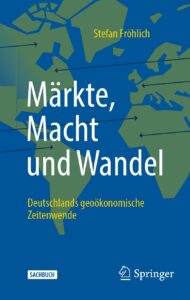
Europa befindet sich im dauerhaften Krisenmodus: Nationalismen, Brexit und scheinbar unüberbrückbare Differenzen in Fragen der Migration, der Reform der Eurozone und der Verbesserung seiner globalen Wettbewerbsfähigkeit gefährden den Zusammenhalt der Union. Gleichzeitig wächst der Druck von außen durch Russland und China, die Entwicklungen an der südlichen Peripherie und nicht zuletzt in den USA. Mit Trumps Wahl zerfällt nicht nur Deutschlands außenpolitisches Koordinatensystem, sondern die liberale internationale Ordnung wird insgesamt auf den Kopf gestellt. Vor diesem Hintergrund plädiert Prof. Dr. Stefan Fröhlich in diesem politischen Essay für eine Neubewertung der deutschen Rolle in Europa und der Welt: Deutschlands Außenpolitik ist besser als ihr Ruf. Das Land hat in den vergangenen Jahren mit zahlreichen Tabus längst gebrochen und Führung in Europa übernommen. Auch deswegen klingen die Vorwürfe derer geradezu zynisch, die unverändert die deutsche Selbstgefälligkeit beklagen, andererseits sich selbst zunehmend Führung und globaler Verantwortung entziehen.
Zur Außenpolitik der Biden-Administration
Veröffentlicht 2021 bei der Gesellschaft für Sicherheitspolitik e. V.

Mit dem Antritt der neuen Administration in Washington verbinden nicht nur Europäer die Hoffnung auf eine Rückkehr der USA auf die Weltbühne und zum Multilateralismus der Obama-Jahre. Ihre Erwartungen könnten allerdings enttäuscht werden, wenn sie Bidens Bekenntnis zur unerschütterlichen Schutzgarantie der USA als Signal in Richtung eines status quo ante im transatlantischen Verhältnis werteten. Zudem könnte Biden mit seinem Anspruch der Wiederherstellung Amerikas machtpolitischer wie moralischer Dominanz an den Erwartungen der amerikanischen Gesellschaft scheitern.
Das Ende der Selbstfesselung: Deutsche Außenpolitik in einer Welt ohne Führung
Veröffentlicht 2021 im Springer Fachmedien Verlag.
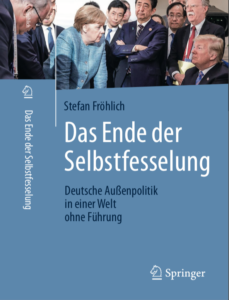
Europa befindet sich im dauerhaften Krisenmodus: Nationalismen, Brexit und scheinbar unüberbrückbare Differenzen in Fragen der Migration, der Reform der Eurozone und der Verbesserung seiner globalen Wettbewerbsfähigkeit gefährden den Zusammenhalt der Union. Gleichzeitig wächst der Druck von außen durch Russland und China, die Entwicklungen an der südlichen Peripherie und nicht zuletzt in den USA. Mit Trumps Wahl zerfällt nicht nur Deutschlands außenpolitisches Koordinatensystem, sondern die liberale internationale Ordnung wird insgesamt auf den Kopf gestellt. Vor diesem Hintergrund plädiert Prof. Dr. Stefan Fröhlich in diesem politischen Essay für eine Neubewertung der deutschen Rolle in Europa und der Welt: Deutschlands Außenpolitik ist besser als ihr Ruf. Das Land hat in den vergangenen Jahren mit zahlreichen Tabus längst gebrochen und Führung in Europa übernommen. Auch deswegen klingen die Vorwürfe derer geradezu zynisch, die unverändert die deutsche Selbstgefälligkeit beklagen, andererseits sich selbst zunehmend Führung und globaler Verantwortung entziehen.
The End of Self-bondage – German Foreign Policy in a World Without Leadership
Veröffentlicht 2021 im Springer Fachmedien Verlag.
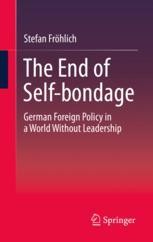 Europe is in a permanent state of crisis: nationalisms, brexit and seemingly insurmountable differences on issues of migration, reforming the euro zone and improving its global competitiveness are threatening the cohesion of the Union. At the same time, external pressure from Russia and China, developments on the southern periphery, and not least in the United States, is growing. Trump’s election not only disintegrates Germany’s foreign policy coordinate system, but also turns the liberal international order upside down. Against this background, Stefan Fröhlich argues for a reassessment of Germany’s role in Europe and the world in this political essay: Germany’s foreign policy is better than its reputation. In recent years, the country has long since broken with numerous taboos and assumed leadership in Europe. This is one of the reasons why the accusations of those who continue to lament German complacency but at the same time evade global leadership and responsibility themselves sound downright cynical.
Europe is in a permanent state of crisis: nationalisms, brexit and seemingly insurmountable differences on issues of migration, reforming the euro zone and improving its global competitiveness are threatening the cohesion of the Union. At the same time, external pressure from Russia and China, developments on the southern periphery, and not least in the United States, is growing. Trump’s election not only disintegrates Germany’s foreign policy coordinate system, but also turns the liberal international order upside down. Against this background, Stefan Fröhlich argues for a reassessment of Germany’s role in Europe and the world in this political essay: Germany’s foreign policy is better than its reputation. In recent years, the country has long since broken with numerous taboos and assumed leadership in Europe. This is one of the reasons why the accusations of those who continue to lament German complacency but at the same time evade global leadership and responsibility themselves sound downright cynical.
This book is a translation of the original German 1st edition Das Ende der Selbstfesselung by Stefan Fröhlich, published by Springer Fachmedien Wiesbaden GmbH, part of Springer Nature in 2019. The translation was done with the help of artificial intelligence (machine translation by the service DeepL.com). A subsequent human revision was done primarily in terms of content, so that the book will read stylistically differently from a conventional translation. Springer Nature works continuously to further the development of tools for the production of books and on the related technologies to support the authors.
The Changing East Asian Security Landscape. Challenges, Actors and Governance
Veröffentlicht 2017/2018 im Springer VS.
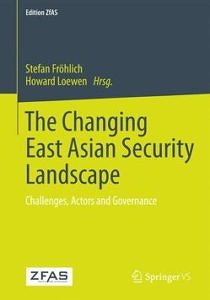
The book by Prof. Dr. Stefan Fröhlich and Prof. Dr. Howard Loewen examines a highly relevant empirical issue in International Rela- tions. A group of renowned scholars analyzes the new dynamics of East Asian Security and its respective governance structure challenging the conventional wisdom that the US as the traditional offshore balancer in the region is still the most definitive element in determining the outcomes in the region. Since the US pivot and other actors’ responses to it the security landscape has changed in form, size and function. In order to analyze and explain these changes, the authors apply hypotheses derived from Inter- national Relations middle range theories (i.e. soft and hard balancing) to cases of bilateral and multilateral security governance in East Asia.
„Suspicious Minds: U.S. German Relations in The Trump Era.“
Veröffentlicht 2017 von der Transatlantic Academy.
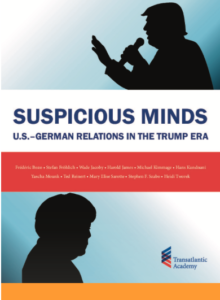
As the Trump administration settles in, and attention turns to the September parliamentary elections in Germany, where is the U.S.-German relationship heading? The fellows of the Transatlantic Academy, Frédéric Bozo, Prof. Dr. Stefan Fröhlich, Wade Jacoby, Harold James, Michael Kimmage, Hans Kundani, Yascha Mounk, Ted Reinert, Mary Elise Sarotte, Stephen F. Szabo and Heidi Tworek have spent the past eight months focusing on this topic. Their report Suspicious Minds: U.S.-German Relations in the Trump Era argues that the relationship, while close at the government level in recent years under Chancellor Angela Merkel and President Barack Obama, is challenged by underlying divisions on economic policies, security policies, and the role of German leadership in the European Union. The presidency of Donald Trump, who has questioned fundamental principles of U.S. foreign policy that have been shared by both parties and go back decades, may dramatically worsen U.S.-German relations. The fellows offer recommendations for U.S., German, and European policymakers going forward.
„Berlin’s New Pragmatism in an Era of Radical Uncertainty“
Veröffentlicht 2017 vom German Marshall Fund.

Germany has emerged as the EU’s central economic and political power in today’s crisis-ridden Europe. The U.K., after the Brexit vote, has probably dropped out of global crisis management for quite a while and the United States, under President Barack Obama, already significantly retrenched from global commitments. Thus the election of Donald Trump marks a pivotal moment for German foreign and security policy as it puts Washington’s European allies under even more pressure to radically rethink their security.
Though Germany does not have the ability or aspiration to act as the world’s liberal hegemon, Berlin is not complacent. Germany has played a leading role in the Western response to Russia’s actions in Ukraine and its role in supporting security on the EU’s southern flank is growing. The country is set to increase its defense budget, and will advance EU defense cooperation, together with France. Berlin has also led Europe in the euro crisis — accepting compromises on a new degree of integration — and in the refugee crisis, a case which shows the limits of German “hegemony” in Europe.
The current situation involves both opportunities and risks, but it does not mean the end of transatlantic cooperation. The Trump administration will realize that the future world order needs interconnected strategies and integrative systems. Without transatlantic cooperation, Washington will not get far in dealing with these challenges. Instead of reacting with the usual mix of resignation and indecision, Germany and its European partners should therefore use Trump’s threats as an opportunity to overcome their own political malaise. The best way to do so will be to provide strong evidence of German (and European) engagement — particularly via higher defense contributions, a more assertive stance vis-a-vis China’s trade and investment policies, and efforts to overcome bilateral trade imbalances.
Die Europäische Union als globaler Akteur
Veröffentlicht 2014 von Springer VS, 2. überarbeitete Neuauflage
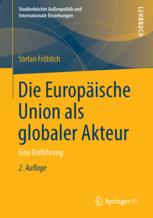
Dieses Studienbuch bietet einen Gesamtblick auf die europäische Außenpolitik und auf die globale Rolle der Europäischen Union. Neben der institutionellen Architektur und Praxis der GASP und ESVP werden die zentralen Dimensionen und Instrumente der europäischen Außenwirtschafts- und Außenbeziehungen sowie das Verhältnis der EU zu den wichtigen internationalen Organisationen, Ländern und Weltregionen behandelt.
Pressestimmen:
„Fröhlich macht deutlich, dass es zu einer aktiven Rolle der EU als globaler Akteur keine Alternativen gibt […] eine eindrucksvolle Schilderung der gemeinsamen Interessen der Europäer […].“ (FAZ, 15.10.2008)
„In seiner hervorragenden Abhandlung […] gelingt es Stefan Fröhlich, das Netz von Außenbeziehungen der Gemeinschaft in seiner gesamten Bandbreite zu repäsentieren.“ (Novo Argumente, 5-8-2009)
„Wer sich fundiert über die außen- und sicherheitspolitische Dimension der EU informieren will, ist mit dem Buch von Fröhlich bestens bedient.“ (Politische Studien, März/April 2008)
Anlass für die Neuauflage dieses Lehrbuchs ist die Änderung der Europäischen Verträge durch den Vertrag von Lissabon.
The New Geopolitics of Transatlantic Relations
Veröffentlicht 2012 von der Johns Hopkins University Press
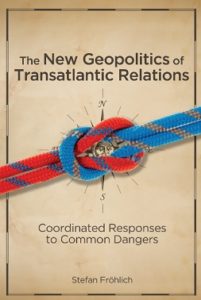
The United States and Europe encounter many of the same foreign policy challenges, challenges that diversely impact the two regions and produce different—but often complementary—responses. In regard to Russia’s renewed assertiveness, for example, the issue for the United States is one of global competition, whereas Europe’s concern is local because Russia is a major supplier of oil and gas. Where the United States may pursue confrontation, Europe is more likely to operate with conciliation. This book develops a framework for future U.S.-Europe relations as the two world powers work toward meaningful and logical solutions to their shared foreign policy problems.
The author identifies commonalities and differences in the two regions‘ economic aims, political habits, and cultural history. What Europe and the United States share means that their future relations should and will be more than occasional collaborations, even if they no longer pursue a common mission. Ultimately, the book sets forth a new transatlantic agenda by discussing principal areas of concern.
„The real contribution of the book lies in the masterful way the author brings together the large complex of issues and trends in the transatlantic relationship in a comprehensive and understandable way. The author provides an excellent and balanced survey of the key trends and fissures between North America and Europe without falling into an unrealistic pessimism. He also brings together an impressive amount of both primary and secondary source material in a well-organized and readable style.“
(Stephen Szabo, Executive Director, Transatlantic Academy )
„What makes this book interesting is the combination of economic, security, and foreign policy considerations as a way to analyze the current state of the Atlantic alliance. It is in this context that it presents an interesting normative approach to the crisis in transatlantic relations prompted by the war in Iraq.“
(Dieter Dettke, former U.S. Representative and Executive Director, Friedrich Ebert Foundation)
Zehn Jahre Deutschland in Afghanistan – Der Deutsche Einsatz in Afghanistan: Eine Bilanz.
Veröffentlicht 2011 vom VS Verlag Wiesbaden: Sonderheft der Zeitschrift für Außen- und Sicherheitspolitik.
(gemeinsam mit Klaus Brummer)
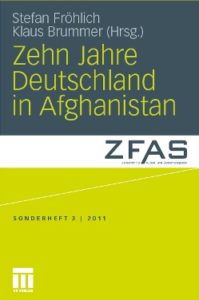
Dieses Sonderheft der „Zeitschrift für Außen- und Sicherheitspolitik“ (ZfAS) analysiert das militärische und zivile Engagement der Bundesrepublik Deutschland in Afghanistan seit 2001. Die 14 Beiträge verorten Deutschlands Afghanistanpolitik im Rahmen von internationalen Organisationen (NATO, EU, Vereinte Nationen), untersuchen die innenpolitische Rückkopplung der deutschen Politik in Parteien und Bevölkerung und beleuchten spezifische Handlungsstrategien (vernetzte Sicherheit) und Handlungsfelder (u. a. Drogenbekämpfung). Sie fragen außerdem nach dem Einfluss von Überzeugungen einzelner Entscheidungsträger auf die deutsche Afghanistanpolitik, diskutieren die Folgen des Einsatzes am Hindukusch für das deutsche „Zivilmachtsverständnis“ und erörtern die Konsequenzen des nunmehr zehnjährigen Engagements in Afghanistan für die transatlantischen Beziehungen. Insgesamt zeigen die Beiträge vielfache Unklarheiten in der deutschen Politik gegenüber Afghanistan auf, etwa: Was bedeutet das Konzept der „vernetzten Sicherheit“ in der Praxis? Befindet sich Deutschland in einem „Krieg“? Und wann muss bzw. darf der Abzug beginnen?
Monographien
In Arbeit
- Fröhlich, S.:
Lehrbuch Internationale Politische Ökonomie
Baden-Baden: Nomos, Anfang 2025
Im Erscheinen
- Fröhlich, S.:
Transatlantic relations at a turning point. How to build a resilient partnership (co-authors: Jack Janes, Jeffrey Rathke)
Springer 2025
Kürzlich erschienen
- Fröhlich, S.:
Märkte, Macht und Wandel. Deutschlands geoökonomische Zeitenwende
Springer: 2024
Weitere
2021
- (Hrsg.):
New Perspectives on Transatlantic Relations. Multidisciplinary Approaches
Heidelberg: 2021
(Publications of the Bavarian American Academy, Bd. 23)
ISBN: 978-3-8253-7251-4
URL: https://www.winter-verlag.de/en/detail/978-3-8253-7251-4/Gebhardt_ea_Eds_Transatlantic_Relations_PDF/ - :
The end of Self-Bondage. German Foreign Policy in a world without leadership
Wiesbaden: Springer VS, 2021
ISBN: 978-3-658-32763-7
DOI: 10.1007/978-3-658-32764-4
URL: https://www.springer.com/gp/book/9783658327637
2019
- :
Das Ende der Selbstfesselung: Deutsche Außenpolitik in einer Welt ohne Führung
Wiesbaden: Springer VS, 2019
ISBN: 978-3-658-25142-0
DOI: 10.1007/978-3-658-25143-7 - :
Das Ende der Selbstfesselung: Deutsche Außenpolitik in einer Welt ohne Führung
Wiesbaden: Springer VS, 2019
ISBN: 978-3-658-25142-0
DOI: 10.1007/978-3-658-25143-7
URL: https://www.springer.com/de/book/9783658251420
2017
- , :
East Asia's Security Architecture and the Role of the United States
Wiesbaden: VS Verlag, 2017
2014
- :
Die Europäische Union als globaler Akteur. Eine Einführung.
Springer VS, 2014
ISBN: ISBN 978-3-658-01982-2
2012
- :
Future Perspectives for Transatlantic Relations
American Institute for Contemporary German Studies, 2012
URL: http://www.aicgs.org/issue/future-perspectives-for-transatlantic-relations/ - :
The New Geopolitics of Transatlantic Relations. Coordinated Responses to Common Dangers
Washington DC (u.a.): Woodrow Wilson Center Press (u.a.), 2012
2011
- , (Hrsg.):
Zehn Jahre Deutschland in Afghanistan
Wiesbaden: 2011
2008
- :
Die EU als globaler Akteur
Wiesbaden: VS-Verlag, 2008
2005
- , (Hrsg.):
Strategic Implications of Euro-Atlantic Enlargement
2005
2004
- :
Major tasks and the state of the art. The work of the EU Convention
Washington: SAIS, 2004 - :
The difficulties of EU governance. What way forward for the EU institutions?
Frankfurt am Main: Peter-Lang-Verlag, 2004
2003
- :
Globalization and the future of the transatlantic relations
Berlin: KAS, 2003
2002
2001
- :
Auf den Kanzler kommt es an. Außen- und Europapolitik in der Ära Kohl in den achtziger Jahren
Paderborn: Schöningh-Verlag, 2001
ISBN: 978-3-506-72740-4
1998
- :
Amerikanische Geopolitik. Von den Anfängen bis zum Ende des Zweiten Weltkrieges
München: Olzog Verlag, 1998
ISBN: 3789293237 - :
Der Ausbau der Europäischen Verteidigungsidentität zwischen WEU und NATO
Bonn: ZEI, 1998 - :
Zwischen selektiver Verteidigung und globaler Eindämmung. Geostrategisches Denken in den USA während des Kalten Krieges
Baden-Baden: Nomos, 1998
ISBN: 378905349X
1997
- :
Fragen einer institutionellen Gestaltung der internationalen Ordnung. Zur aktuellen Theoriedebatte
Sankt Augustin: KAS, 1997 - :
Möglichkeiten amerikanisch-europäischer Kooperation: Der Aktionsplan zur Transatlantischen Agenda
Sankt Augustin, 1997
1992
- :
Die USA und die neue Weltordnung. Amerikanische Außenpolitik nach dem Ende des Kalten Krieges
Bonn/Berlin: Bouvier Verlag, 1992
1990
- :
Nuclear Freeze Campaign. Die Kampagne für das Einfrieren der Nuklearwaffen unter der Reagan-Administration
Opladen: Leske und Budrich, 1990
Sammelbandbeiträge
2024
- Fröhlich, S.:
Zwischen Rückzug und fortgesetztem globalen Engagement. Wohin steuert die US-Außenpolitik?
In: Lammert, Christian, Siewert, Markus B., Vormann, Boris (Hrsg.): Handbuch Politik USA, 3.Ed., Wiesbaden: Springer VS, 2024 - Fröhlich S.:
Die Rolle der USA im Nahen Osten
In: Handbuch Arabische Halbinsel, Wiesbaden: Springer, 2024 - Fröhlich, S.:
Germany and EU Foreign Policy
In: Handbook on EU External Action, London: Routledge, 2024
Weitere
2020
- :
Außenpolitik. Leitlinien und Traditionen
In: Lammert, Christian, Siewert, Markus B., Vormann, Boris (Hrsg.): Handbuch Politik USA, Wiesbaden: Springer VS, 2020, S. 593-606
ISBN: 978-3-658-23844-5
DOI: 10.1007/978-3-658-23845-2
URL: https://www.springer.com/de/book/9783658238445#aboutBook - :
Der Einfluss äußerer Wirkkräfte auf den europäischen Einigungsprozess
In: Becker, Peter, Lippert, Barbara (Hrsg.): Handbuch Europäische Union, Wiesbaden: Springer VS, 2020, S. 71-86
ISBN: 978-3-658-17408-8
DOI: 10.1007/978-3-658-17409-5
URL: https://link.springer.com/referencework/10.1007/978-3-658-17436-1#about
2018
- , , :
Globalisierung
In: Görres Gesellschaft, Verlag Herder (Hrsg.): STAATSLEXIKON. Recht. Wirtschaft. Gesellschaft. Zweiter Band. Eid - Hermeneutik., Regensburg: Verlag Herder, 2018, S. 1383-1398 (STAATSLEXIKON. Recht. Wirtschaft. Gesellschaft., Bd.Zweiter Band)
2017
- :
Die transatlantischen Beziehungen
In: Thomas Jäger (Hrsg.): Die Außenpolitik der USA: Eine Einführung, Wiesbaden: VS-Verlag, 2017
2016
- :
Partners and Competitors The US and the EU
In: Donette Murray, David Brown (Hrsg.): Global Power Relations in the 21st Century. Mapping a multipolar world, London: Routledge, 2016
2015
- :
Partners and Competitors -The US and Europe
In: Sven Biscop, Alexander Mattelaer (Hrsg.): The Ashgate Research Companion to the Foreign Policies of Europe, London: Ashgate, 2015 - :
The role of civil society in the process of regional integration - The European experience
In: Ablam Benjamin Akoutou, Rike Sohn, Matthias Vogl, Daniel Yeboah (Hrsg.): Migration and Civil Society as Development Drivers - A Regional Perspective, Prag/Bonn: WAI-ZEI Paper, 2015, S. 41 - 55
2014
- :
Das amerikanisch-sowjetische Gipfeltreffen von Reykjavik 1986 und Kohls Verzicht auf die INF-Waffen
In: Hans-Otto Kleinmann, Hanns-Jürgen Küsters (Hrsg.): Historisch-Politische Mitteilungen, 21, Köln-Weimar-Wien: Böhlau-Verlag, 2014, S. 255 - 264 - :
Leitlinien der US-Amerikanischen Außenpolitik
In: Lammert, Christian / Siewert, Markus / Vormann, Boris (Hrsg.): Handbuch Politik USA, Wiesbaden: VS-Springer, 2014, S. 523 - 539
2013
- :
Zur künftigen deutschen Außen- und Sicherheitspolitik
In: Brummer Klaus, Pehle Heinrich (Hrsg.): Analysen nationaler und supranationaler Politik, Opladen: Budrich, 2013, S. 177-192
2012
- :
Dilemmata bei der Suche nach einer neuen Rolle? Deutschlands gewachsene Anforderungen beim außenpolitischen Krisenmanagement
In: Jesse Eckhard, Sturm Roland (Hrsg.): "Superwahljahr" 2011 und die Folgen, Baden-Baden: Nomos, 2012, S. 345-364
2011
- , :
Einleitung: Zehn Jahre Deutschland in Afghanistan
In: Brummer Klaus, Fröhlich Stefan (Hrsg.): Zehn Jahre Deutschland in Afghanistan, Wiesbaden: Springer VS, 2011, S. 3-30 - :
Die EU als sicherheitspolitischer Akteur
In: Meier-Walser Reinhard, Wolf Alexander (Hrsg.): Berichte und Studien 93: Neue Dimensionen internationaler Sicherheitspolitik, München: Hanns-Seidel-Stiftung, 2011, S. 291-302 - :
Szenarien für die künftige Rolle der USA in der Weltpolitik
In: Louis-Marie Clouet / Andreas Marchetti (Hrsg.): Europa und die Welt 2020. Entwicklungen und Tendenzen, Baden-Baden: Nomos, 2011, S. 99 - 108 - :
Vernetzte Sicherheit in Europa nach Lissabon
In: Pöttering Hans-Gert, Kaldrack Gerd (Hrsg.): Eine einsatzfähige Armee für Europa. Die Zukunft der Gemeinsamen Außen- und Sicherheitspolitik nach Lissabon, Baden-Baden: Nomos, 2011, S. 358-366 - :
Zur künftigen Rolle der USA in der Welt
In: Marchetti Andreas, Clouet Louis-Marie (Hrsg.): Europa und die Welt 2020. Entwicklungen und Tendenzen, Baden-Baden: Nomos, 2011, S. 99-106
2010
- :
Zwischen den USA, Russland und anderen regionalen Vormächten: Zur Rolle der EU in der Welt
In: Leiße Olaf (Hrsg.): Die Europäische Union nach dem Vertrag von Lissabon, Wiesbaden: VS Verl. für Sozialwiss., 2010, S. 309-332
ISBN: 978-3-531-92232-4
DOI: 10.1007/978-3-531-92232-4
URL: http://www.springer.com/la/book/9783531160726 - , :
De la normalisation de la politique étrangère allemande au changement de référentiel francais: une redistribution des ressources dans le cadre de PESC/PESD
In: Demesmay Claire, Marchetti Andreas (Hrsg.): La France et l'Allemagne face aux crises européennes, Bordeaux: Presses Univ. de Bordeaux, 2010, S. 127-143
2009
- :
Whither USA? Taumelt der „sanfte Hegemon"?
In: Meier-Walser Reinhard (Hrsg.): Berichte & Studien 89: Amerikanische Außenpolitik im Wandel, München: Hanns-Seidel-Stiftung, 2009, S. 15-27
2008
- :
Der Greater Middle East als gemeinsame Herausforderung der euro-atlantischen Gemeinschaft
In: Volker Kronenberg / Jana Puglierin / Patrick Keller (Hrsg.): Außenpolitik und Staatsräson. Festschrift für Christian Hacke zum 65. Geburtstag, Baden-Baden: Nomos, 2008, S. 167 - 176 - :
Die Europäisierung der Bundesrepublik
In: Hans Peter Schwarz (Hrsg.): 60 Jahre Bundesrepublik; 20 Jahre Ende der Teilung, München: Landeszentrale für Politische Bildung, 2008, S. 511 - 530 - :
Probleme einer Weltfriedensordnung
In: Rauscher, Anton (Hrsg.): Handbuch der Katholischen Soziallehre, Berlin: Duncker & Humblot, 2008, S. 1011 - 1020
2007
- :
The European Neighbourhood Policy: An adequate Instrument for Democratization?
In: Johannes Varwick / Kai-Olaf Lang (Hrsg.): European Neighbourhood Policy. Challenges for the EU policy towards the new neighbours, Opladen/Farmington Hills: Barbara Budrich Publishers, 2007, S. 75 - 86
2006
- :
Die GASP nach der Erweiterung
In: Niedermeier, Alexander / Pehle, Heinrich / Sturm, Roland (Hrsg.): Die neue EU. Die Osterweiterung und ihre Folgen, Opladen: VS-Verlag, 2006 - :
Die special relationship: Großbritannien und die USA
In: Kastendiek, Hans / Sturm, Roland (Hrsg.): Länderbericht Großbritannien, Opladen / Farmington Hills: Barbara Budrich, 2006 - :
Die USA – Die einzig verbliebene Supermacht
In: Piazolo, Michael (Hrsg.): Macht und Mächte in einer multipolaren Welt, Wiesbaden: VS-Verlag, 2006, S. 53 - 78 - :
Perspektiven für die deutsche Außenpolitik unter der Großen Koalition
In: Pehle, Heinrich / Sturm, Roland (Hrsg.): Wege aus der Krise? Die Agenda der neuen Bundesregierung, Opladen: Springer VS, 2006
2005
- :
Die Bedeutung der Erweiterung von NATO und EU für die transatlantischen Sicherheitsbeziehungen
In: Varwick, Johannes (Hrsg.): Die Beziehungen zwischen NATO und EU. Partnerschaft, Konkurrenz, Rivalität, Opladen: Barbara Budrich, 2005, S. 239 - 256
2004
- :
Euro-Atlantic Enlargement and its implications for ESDP
In: Kai-Olaf Lang, Andreas Maurer, Eugene Whitlock (Hrsg.): New Stimulus or Integration Backlash?, Berlin: SWP, 2004, S. 29 - 35 - :
Mentalitätsgeschichtliche Prägungen deutscher Außenpolitik
In: Bonner Schriftenreihe, Bonn: , 2004
2003
- :
(Geo)strategic Implications of Euro-Atlantic Enlargement
In: Woodrow Wilson International Center for Scholars (Hrsg.): The Transatlantic Relationship: Problems and Prospects, Washington, DC: , 2003
2002
- :
Außen- und sicherheitspolitische Herausforderungen 1949/50
In: Ranke Gesellschaft (Hrsg.): Deutschland 1949- 1989: Zweierlei Anfang, Wiesbaden: Franz Steiner-Verlag, 2002 - :
Die Auswirkungen des „11. September“ auf das transatlantische Verhältnis
In: Sabine Sielke (Hrsg.): America under Attack, Frankfurt am Main: Peter Lang-Verlag, 2002 - :
Die USA, die EU und die ökonomischen Herausforderungen der Globalisierung
In: Hanns Seidel-Stiftung (Hrsg.): Die euro atlantischen Beziehungen im Spannungsfeld von Regionalisierung und Globalisierung, München: , 2002 - :
German identity and European Integration
In: Alkan, Neil (Hrsg.): The Role of national identies in the European integration process, Ankara: , 2002 - :
„Potestas Indirecta“ in der Kanzlerdemokratie – der „immerwährende“ Außenminister und die Richtlinienkompetenz der Kanzler
In: Hans-Dieter Lucas (Hrsg.): Genscher, Deutschland und Europa, Baden-Baden: Nomos, 2002, S. 323 - 342
2001
- :
Auswirkungen veränderter internationaler Rahmenbedingungen auf das transatlantische Verhältnis
In: Ost-West-Kolleg und bpb (Hrsg.): Die Zukunft der transatlantischen Beziehungen. Gemeinsamkeiten und Differenzen im Kontext der Globalisierung, Brühl: , 2001 - :
Die EU als globaler Akteur
In: Kühnhardt, Ludger (Hrsg.): In welcher Verfassung ist Europa – Welche Verfassung für Europa, Baden-Baden: Nomos, 2001 - :
European Defence: from a virtual enterprise to a real topic
In: KAS (Hrsg.): The Republic of Macedonia in the European Stability System, Skopje: , 2001 - :
Integrationspolitik als Krisenpräventionspolitik. Die EU und ihr Engagement in ausgewählten Krisenregionen
In: Kirt, Roman (Hrsg.): Die EU und ihre Krisen. Eine unkonventionelle Geschichte der europäischen Integration, Baden-Baden: Nomos, 2001 - :
Phönix aus der Asche – Von der Zweckgemeinschaft zur Politischen Union
In: Lensch, Günther (Hrsg.): Akademie Forum Masonicum, Jahrbuch 2000/2001, Bonn: , 2001
2000
- :
Challenges and Perspectives for the European Security and Defense Identity
In: Dirk Rochtus (Hrsg.): Challenges and Perspectives for Europe. 10 Years after the fall of the wall, 2000 - :
Der Mittelmeerraum im strategischen Interessenkalkül der Vereinigten Staaten
In: M. Hoch, C. Masala, A. Jacobs (Hrsg.): Hannibal ante portas?, Ebenhausen: SWP, 2000 - :
Les conceptions allemandes en matière de sécurité et politique extérieure 1949-1963
In: Menudier, Henri (Hrsg.): La Republique Federale d’Allemagne et la Construction de l’Europe, Paris: , 2000 - :
The chances and challenges of Eastern Enlargement
In: European Institute Sofia (Hrsg.): Reviewing Bularia’s Progress towards EU membership, Sofia: , 2000 - :
The New NATO as a Common Project – Reform, Enlargement, and Beyond
In: ZEI (Hrsg.): The Future of Euro-Atlantic Relations, Baden-Baden: Nomos, 2000
1999
- :
Geopolitik in den USA
In: Schoeps, Julius (Hrsg.): Geopolitik – Grenzgänge im Zeitgeist, Bd. II: 1945 bis zur Gegenwart, Potsdam: , 1999 - :
Überforderter „Stabilitätsanker“? Die Europäische Union zwischen Arbeitslosigkeit, WWU und Osterweiterung
In: Jahrbuch Internationale Politik (DGAP), 1995/1996, München: Oldenbourg Verlag, 1999 - :
Weltordnung durch Gleichgewichtspolitik. Der neorealistische Ansatz von Kenneth Waltz
In: H-J. Küsters, P. Weilemann, G. Buchstab (Hrsg.): Macht und Zeitkritik. Festschrift für Hans-Peter Schwarz, Paderborn: Schöningh-Verlag, 1999
1997
- :
Images of America in Unified Germany
In: Literator – „Wende-Literatur“, Potchefstroom: , 1997 - :
The Misuse of power politics and Attempts of a Revival – The German Case
In: Budapest Institute for Graduate International and Diplomatic Studies u. Friedrich-Naumann-Stiftung (Hrsg.): Gleichgewichts- and Realpolitik in European History, Budapest: , 1997
1996
- :
Political Leadership in German History
In: Pombeni, Paolo (Hrsg.): The Problem of Political Leadership between History and Political Science, Bologna: , 1996
1995
- :
Das Manhattan-Projekt
In: Salewski, Michael (Hrsg.): Fünfzig Jahre Atombombe, München: Beck-Verlag, 1995 - :
Die USA, Europa und das transatlantische Verhältnis
In: Friedrich-Naumann-Stiftung (Hrsg.): Deutsche Außenpolitik unter veränderten Rahmenbedingungen, 1995
1993
- :
Die „Deutsche Frage“ im Kontext globaler US-amerikanischer Sicherheitspolitik nach 1945
In: Ranke-Gesellschaft (Hrsg.): Deutschland und der Westen im 19. und 20. Jahrhundert, Wiesbaden / Stuttgart: Franz Steiner Verlag, 1993
Beiträge in Fachzeitschriften
2022
- Fröhlich S.:
Europas Selbstbehauptung in Zeiten geostrategischer Herausforderungen
In: Einsichten+Perspektiven (02/22), pp. 12-21
Weitere
2021
- :
Prof. Dr. Stefan Fröhlich: Zur Außenpolitik der Biden-Administration
GSP Einblick (2021)
ISSN: 2701-4088
URL: https://www.gsp-sipo.de/news/news-details/zur-aussenpolitik-der-biden-administration
(online publication)
2020
- :
Die Rückkehr der nuklearen Frage
In: Europäische Sicherheit & Technik 20 (2020)
ISSN: 2193-746X
URL: https://esut.de/2020/01/fachbeitraege/18076/die-nukleare-frage-ist-zurueck/ - :
Partnership in Leadership: A new beginning. Neue Impulse für die transatlantischen Beziehungen
(2020)
URL: https://www.cassis.uni-bonn.de/de/ueber-cassis/Prof-Ulrich-Schlie/task-force-zukunft-der-transatlantischen-beziehungen
(online publication) - :
Trump’s mirror to Germany: A reflection on four years
(2020)
URL: https://spectator.clingendael.org/nl/publicatie/trumps-mirror-germany-reflection-four-years
(online publication)
2017
- :
Berlin’s New Pragmatism in an Era of Radical Uncertainty
2017/01 (2017)
URL: http://www.gmfus.org/publications/leadership-partnership-berlins-new-pragmatism-era-radical-uncertainty
(online publication) - :
Germany Cannot Replace the US, But Europe Can Live with Trump
(2017)
URL: http://transatlanticrelations.org/publication/germany-cannot-replace-us-europe-can-live-trump-stefan-frohlich/
(online publication) - :
Looking to Germany. What Berlin Can and Can't Do for the Liberal Order
In: Council on Foreign Relations (Hrsg.): Foreign Affairs, 2017
URL: https://www.foreignaffairs.com/articles/germany/2017-01-29/looking-germany
(online publication) - :
The New US Foreign and Security Policy vis-á-vis Northeast Asia
Panorama: Insights into Asian and European Affairs (2017), S. 91-102
URL: http://www.kas.de/wf/doc/kas_52131-1522-2-30.pdf?180425110135
(online publication) - , , , , , , , , , , :
Suspicious Minds: U.S.-German Relations in the Trump Era
(2017)
URL: http://www.gmfus.org/publications/new-report-trump-administration-must-cooperate-europe-germany-needs-creatively-boost
(online publication) - , , :
NATO's Northern Alliance. How Berlin, London, and Oslo Can Strengthen Ties
In: Foreign Affairs (2017)
URL: https://www.foreignaffairs.com/articles/northern-europe/2017-03-15/natos-northern-alliance
(Zeitungsartikel)
2016
- :
Berlin’s New Pragmatism: Will It Be Enough After Trump’s Election?
(2016)
URL: http://www.gmfus.org/blog/2016/11/10/berlins-new-pragmatism-will-it-be-enough-after-trumps-election
(online publication) - :
Towards More Pragmatism: German Foreign Policy after the Euro Crisis
In: Insight Turkey 18 (2016), S. 45-56
ISSN: 1302-177X
URL: http://search.proquest.com/openview/0dd8da2f060a780278bbc64ea5148614/1?pq-origsite=gscholar&cbl=54734 - :
Transatlantic Leadership in a multipolar world: The EU perspective
In: European foreign affairs review 21 (2016), S. 415-429
ISSN: 1384-6299
URL: http://www.kluwerlawonline.com/abstract.php?area=Journals&id=EERR2016028
2013
- :
Getting the Expectations Right: No Great PostElection Changes for Transatlantic Relations
(2013)
URL: http://www.aicgs.org/issue/getting-the-expectations-right-no-great-post-election-changes-for-transatlantic-relations/
(online publication) - :
Perspektiven für das transatlantische Verhältnis
In: Gesellschaft, Wirtschaft, Politik 62 (2013), S. 523 - 534
ISSN: 1619-6910
2012
- , :
Zehn Jahre Deutschland in Afghanistan
In: Atlantischer Kurier (2012), S. 12-22
URL: http://www.deutscheatlantischegesellschaft.de/cms/upload/pdf/Atlantischer%20Kurier_Online.pdf - :
Die künftige transatlantische Agenda
(2012)
Open Access: http://atlantische-initiative.org/2012/04/10/die-kunftige-transatlantischen-agenda/
URL: http://atlantische-initiative.org/2012/04/10/die-kunftige-transatlantischen-agenda/
(online publication) - :
Herausforderungen der deutschen Außen- und Sicherheitspolitik bis 2030: Grundlegende Problemstellungen
In: Zeitschrift für Außen- und Sicherheitspolitik 5 (2012), S. 403-413
ISSN: 1866-2188
DOI: 10.1007/s12399-012-0271-6 - :
US-Wahlen: Perspektiven für das transatlantische Verhältnis
(2012)
URL: http://atlantische-initiative.org/2012/11/05/us-wahlen-perspektiven-fur-das-transatlantische-verhaltnis/
(online publication)
2011
- :
Zur Rolle der EU in der Welt
In: Politische Bildung (2011)
ISSN: 0554-5455
2009
- :
Außenpolitik unter Obama – pragmatischer Multilateralismus und transatlantische Annäherungen
In: Integration 32 (2009), S. 3-16
ISSN: 0720-5120
DOI: 10.5771/0720-5120-2009-1-3 - :
Transatlantische Beziehungen unter Obama
In: Integration (2009)
ISSN: 0720-5120
2008
- :
Deutsche Außen und Sicherheitspolitik im Rahmen der EU
In: Aus Politik und Zeitgeschichte (2008)
ISSN: 0479-611X - :
Die Außenbeziehungen der EU unter besonderer Berücksichtigung der Außenwirtschaftspolitik
In: Gesellschaft, Wirtschaft, Politik (2008)
ISSN: 1619-6910 - :
Energiesicherheit im 21. Jahrhundert
In: Internationales Magazin für Sicherheit (2008)
ISSN: 1866-6736 - :
Perspectives for the future transatlantic relations
(2008)
(online publication) - :
The EU and the US: Peace Brokers for a Secure Georgia
(2008)
URL: http://www.atlantic-community.org/index.php/Open_Think_Tank_Article/The_EU_and_the_US%3A_Peace_Brokers_for_a_Secure_Georgia
(online publication)
2007
- :
EU Summit sets blueprint for improved decision-making
In: European foreign affairs review 8 (2007)
ISSN: 1384-6299
2005
- :
Europas wirtschaftliche Schwäche. Die Halbzeitbilanz der Lissabon-Strategie
In: Internationale Politik (2005)
ISSN: 1430-175X
2004
- :
Amerikas strategische Neuausrichtung in der Außenpolitik nach dem 11. September 2001 und ihre Auswirkungen auf das transatlantische Verhältnis
In: Universität Passau, Institut für Politikwissenschaft (Hrsg.): Politik im Netz, 2004
(Working Paper) - :
How much regional differentiation is necessary to establish a successful CSCE-analogous process in the Greater Middle East
(2004)
(Working Paper) - :
Völkerrecht und der präventive Einsatz militärischer Gewalt – Die Auswirkungen des Irak-Krieges
In: Gesellschaft, Wirtschaft, Politik (2004)
ISSN: 1619-6910
2002
- :
Abschied vom alten System – Die Erweiterung erfordert weitere Reformen der EU-Institutionen
In: Zeitschrift für Politikwissenschaft (2002)
ISSN: 1430-6387 - :
Constitutional reforms and a catalogue of competences as major challenges for the ongoing Intergovernmental Conference
(2002)
ISSN: 1303-2518
(Working Paper) - :
Die Transatlantische Wirtschaftsgemeinschaft: Partner auf Gedeih und Verderb
In: Internationale Politik (2002)
ISSN: 1430-175X - :
Multilateralismus und Unilateralismus – Konstanten in der amerikanischen Außenpolitik
In: Aus Politik und Zeitgeschichte (2002)
ISSN: 0479-611X - :
Nizza reicht nicht aus – Zur weiteren Reform der Institutionen
In: Die politische Meinung (2002)
ISSN: 0032-3446 - :
Was wird aus der NATO?
In: Politische Studien (2002)
ISSN: 0032-3462
2001
- :
Institutional Reforms and Enlargement – the two big challenges of the EU
(2001)
(Working Paper)
2000
- :
Germany in Europe. Perspectives of German European Policy after the elections in 1998
(2000)
(Working Paper)
1999
- :
Die Gemeinsame Außen- und Sicherheitspolitik der EU
In: Das Parlament (1999)
ISSN: 0031-2258
1998
- :
German Foreign and European Policy after Unification
In: Foreign Policy (1998)
ISSN: 0015-7228 - :
The Common Foreign and Security Policy of the EU between the French, the German, and the British perception
3 (1998)
(Working Paper)
1997
- :
Die Frage der political leadership in Großbritannien im Vergleich zu anderen westlichen Systemen
In: Aus Politik und Zeitgeschichte (1997)
ISSN: 0479-611X - :
Die Osterweiterung der NATO erfordert die organisatorische Neugestaltung des Bündnisses
In: KAS Auslandsinformation, 1997
(Working Paper) - :
Die These von der Präsidentialisierung des britischen Regierungssystems in der aktuellen Theoriediskussion
In: Zeitschrift für Parlamentsfragen (1997)
ISSN: 0340-1758 - :
Die USA nach den Wahlen – Was von einer zweiten Amtszeit Clinton zu erwarten ist
In: Die politische Meinung (1997)
ISSN: 0032-3446 - :
Die US-Wahlen 1996 – Eine Analyse der Kampagne und des Wahlergebnisses
In: KAS Auslandsinformation, 1997
(Working Paper) - :
Eine theoretische Auseinandersetzung mit den Grundprämissen der amerikanischen Nachkriegs-Außenpolitik
In: Historische Mitteilungen, 1997
(Working Paper) - :
Verfassungsreformprozesse in Mittel- und Osteuropa. Typologie des modernen Verfassungsstaates
In: Internationale Politik (1997)
ISSN: 1430-175X
1996
- :
The Role of political ideologies in the German constitution-building process
In: Journal of Political Ideologies 1 (1996)
ISSN: 1356-9317
1994
- :
Europe after Maastricht – Implications for the future Europeans Security Structures
In: SAIS Review (1994)
ISSN: 0036-0775 - :
Existentieller Realismus
In: Neue Gesellschaft/Frankfurter Hefte, 1994
(Working Paper)
1993
- :
Bush im Kennedeyschen Gewand. Aus dem politischen Ideenhaushalt der Clinton-Administration
In: Politische Studien (1993)
ISSN: 0032-3462 - :
Der russische Reformprozeß in Richtung Marktwirtschaft. Was kann westliche Hilfe leisten?
(1993)
(Working Paper) - :
Der Sicherheitsbegriff wird mehrdimensional. Theoretische und praktische Vorstellungen auf dem Weg zu einer gesamteuropäischen Ordnung
In: Zeitschrift für Politik (1993)
ISSN: 0044-3360 - :
German Foreign Policy At the Crossroads
(1993)
(Working Paper)
1992
- :
Die USA, Europa und die transatlantischen Beziehungen
In: Aus Politik und Zeitgeschichte (1992)
ISSN: 0479-611X - :
Nach dem Putsch in Moskau. Keine Zeit für westliches Lavieren
(1992)
(Working Paper)
1991
- :
Amerikanisch-europäische Schwierigkeiten im GATT-Prozeß
(1991)
(Working Paper) - :
Der große Markt. Interdependenzen im Weltwirtschaftssystem
In: Die politische Meinung (1991)
ISSN: 0032-3446 - :
Die republikanische Theorie des Friedens. Einige nicht-militärische Bedingungen europäischer Sicherheit
In: Innovations (1991)
ISSN: 0095-4519
1990
- :
Die NATO und Deutschland. Zur Ausgangssituation 1955 und 35 Jahre danach
(1990)
(Working Paper) - :
Umbruch in Europa, Die deutsche Frage und ihre sicherheitspolitischen Herausforderungen für die Siegermächte
In: Aus Politik und Zeitgeschichte (1990)
ISSN: 0479-611X - :
Wider die nukleare Bedrohung . Die amerikanische „Nuclear Freeze Campaign“ 1980-84
In: Vierteljahrshefte für Zeitgeschichte (1990)
ISSN: 0042-5702
